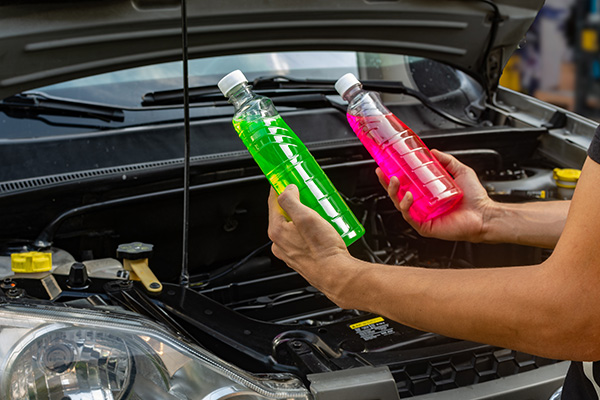
Keeping your car’s engine cool is required for a smooth, reliable ride. But while oil changes are routine, coolant replacement often falls by the wayside. How often should you actually replace your car’s coolant to keep things running efficiently? Let’s explore how coolant works, signs that it’s time for a replacement, and the intervals recommended for different types of coolant.
The Role of Coolant in Your Car
Coolant, or antifreeze, is the lifeblood of your car’s cooling system. It’s a special fluid that absorbs heat from the engine and carries it to the radiator, where it dissipates. This keeps your engine at a safe operating temperature, protecting it from overheating in the summer and freezing in the winter. Besides regulating temperature, coolant also prevents corrosion, lubricates the water pump, and even reduces emissions. Simply put, keeping fresh coolant in your car’s system is essential for engine health and overall performance.
Signs It’s Time to Replace Your Coolant
Even if you’re within the suggested mileage or years for your coolant type, certain signs indicate it’s time for a coolant change. Ignoring these signs could lead to overheating, corrosion, and costly engine repairs.
Temperature Gauge Warning
If you see your temperature gauge rise to the red zone or notice an engine overheating warning light, it’s a clear sign your cooling system may be compromised. Old or low coolant might be the culprit.
Discolored Coolant
Coolant should be a vibrant color—usually green, pink, or orange, depending on the type. If you check your coolant reservoir and see that the fluid is dark, rusty, or murky, it’s time to change it. Discoloration often means the coolant’s anti-corrosion properties have degraded.
Unusual Smells
A sweet, syrupy smell coming from under the hood may indicate a coolant leak. Coolant can leak from various parts of the system, including hoses, the radiator, or the water pump. If you notice this smell, it’s wise to check your coolant levels and consider a replacement or repair.
Sludge Build-Up
Sometimes, old coolant can turn into a gel-like substance, clogging the radiator and cooling system passages. This sludge not only decreases coolant efficiency but can also block flow, causing overheating and system strain.
Why Regular Coolant Replacement Matters
Neglecting coolant replacement can cause major issues. Old coolant loses its effectiveness, making it harder for your car to regulate temperature. This can lead to engine overheating—a situation that’s both inconvenient and potentially expensive to fix. But beyond overheating, old coolant can cause internal corrosion, which may damage the radiator, water pump, and engine parts. Rust particles and debris from degraded coolant can clog your system, leading to more frequent breakdowns and reduced fuel efficiency.
Regular coolant replacement also helps maintain the resale value of your vehicle. Buyers appreciate a car that’s been well cared for, and a well-documented maintenance history can make a significant difference if you decide to sell down the road.
Maintaining Your Car’s Cooling System for Optimal Performance
While coolant replacement is essential, it’s just one part of a healthy cooling system. Here are a few maintenance tips to keep your cooling system in top condition:
Inspect Coolant Levels Regularly
Periodically check your coolant reservoir, especially before a long trip or seasonal temperature changes. Make sure the coolant is between the “Full” and “Low” lines.
Look for Leaks
Take a quick look under your vehicle for any signs of leaking coolant. If you notice any puddles or spots, investigate further to locate and address the source of the leak.
Flush the System When Necessary
Over time, contaminants can build up, reducing coolant efficiency. Flushing the system removes old coolant and debris, making room for fresh fluid. Many manufacturers recommend a system flush every time the coolant is changed.
Follow Manufacturer Recommendations
Every car is different, so always refer to your owner’s manual for coolant type and change intervals. Using the correct coolant and following recommended intervals will go a long way toward ensuring your car’s longevity.
Don’t let an overheating engine ruin your ride. Contact Inmon Automotive for professional cooling system maintenance that’ll keep you on the road with confidence.